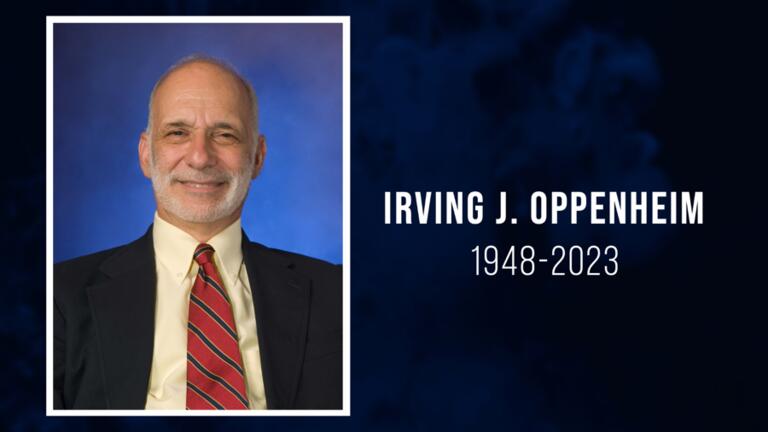Remembering Irving Oppenheim (1948-2023)

Dr. Irving Oppenheim, emeritus professor in Carnegie Mellon University’s School of Architecture (SoA) and Civil and Environmental Engineering (CEE) department, passed away on February 26, 2023, at 74 years old. Oppenheim served on the faculty with great distinction from 1972 until retiring in 2022.
Oppenheim left an indelible mark on countless students, faculty, and staff in his 50 years of service to the SoA and CEE. The unique connection between the two departments is an interdisciplinary testament to his legacy as an educator and researcher. Oppenheim is remembered fondly for his singular mastery of the language of communicating across disciplines. He shared his passion for his work and the arts freely, and the stories of those his life touched painted the portrait of a mentor, a friend, and a humanist.
Recognized throughout his career as an outstanding teacher, in 2006, Oppenheim received the Benjamin Richard Teare Award for excellence in engineering education, the highest recognition for teaching in the college. When called upon, he rose to provide leadership both as Acting Head of the SoA in 1988-1989 and as acting head of CEE in 2013.
“Irving left an indelible mark on the School of Architecture, its students, faculty and staff. He was generous, caring and above all a unique mind that seamlessly traversed between design and engineering. He will be greatly missed,” said Head of the School of Architecture, Omar Khan.
“Irving was an exceptional colleague whose impact was felt by faculty, staff, and students alike,” said professor and CEE department head Burcu Akinci. “He demonstrated an unwavering dedication to his work, an outstanding work ethic, a strong sense of service, and was a true friend and a mentor to many. His absence will be deeply felt by the CEE community.”
“My relationship with Irving comprised 50 years, starting first being his student at the Ice City project in Fargo, ND in January 1973 to being his colleague teaching the complementary SoA courses – Structures and Materials and Assemblies – to being the recipient of his sage advice during my 12 years as the head of the SoA. I am inspired by our relationship in my work and know that he will be missed by all,” added SoA Professor Steve Lee.
Oppenheim’s expertise in the design and failure analysis of structures was applied over the course of his research career. Most recently, he collaborated with Electrical and Computer Engineering colleagues to develop novel devices and signal-processing methods for structural sensing.
Utilizing the campus as a real-world lab, Oppenheim studied ultrasonic scatterer detection in pipes and developed MEMS devices for vibration sensing and for acoustic emission testing. He also studied wireless ultrasonics inductive coupling and chemical and strain sensing, which led to innovative methods to manipulate microparticles in microfluidic channels using SAW devices.
Earlier, Oppenheim’s research focused on structural dynamics, lifeline earthquake engineering, robotics, and computer-aided-engineering. He conducted field tests of ambient vibrations in buildings, studied force-cognitive manipulation, and investigated dynamically stable robots.
Oppenheim also conducted several analytical studies, including historical masonry, tensegrity structures, nonlinear dynamics, optimization, geometric reasoning, and shape grammars.
His lifelong journey in engineering began in his native New York City at The Cooper Union, where Oppenheim received his B.E. degree, before earning his M.S. degree at Lehigh University and his PhD from the University of Cambridge. In 1970 he worked in the design office at the Port Authority of New York and New Jersey, where he met his future wife, Lisa Anderson, before accepting a joint appointment in CEE and SoA in 1972.
In addition to his immense academic contributions, colleagues and former students warmly recalled Oppenheim’s appreciation for paintings and his many musical performances during CEE talent shows. Those in attendance at his retirement celebration were treated to a humorous rendition of a song he’d written called Registration Blues, in keeping with CEE and SoA’s “shared tradition of musical comedy.” Oppenheim also shared with those gathered in his honor that “it has been my greatest privilege and good fortune to have served in these roles at Carnegie Mellon University.”
The School of Architecture and CEE department extend their condolences to the friends and family of Dr. Oppenheim as we fondly recall his time with Carnegie Mellon. He will be missed by many.